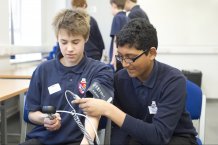
Pupils from St Peter's School using the equipment.
School children solve genetic riddle
Children from Devon, Dorset and Somerset got hands-on in University laboratories as they used genetic processes commonly seen in TV crime dramas to help solve a mystery.
The children tackled a scenario in which scandal had erupted on Devon’s sporting scene as previously unknown athletes smashed all known records. Police called on the only team who can scrutinise the mysterious yeast found in their bags: The X-Men in White.
This crack team of nearly 150 science sleuths, drawn from schools across Devon, Dorset and Somerset, worked with special operatives from the University of Exeter Medical School on March 9 and 10. They needed all their genetics genius to identify which of three supervillains is guilty of rigging Devon’s premier sporting event by doping runners with a mutant yeast.
Now in its 11th year, the Medical School’s popular outreach event engages Year 9s from eleven schools. The engaging plot sees pupils stain yeast DNA on slides and examine them under microscopes to find the mutant strain, as well as having a go at clinical procedures such as blood sugar sampling and blood pressure testing to learn more about their bodies.
Professor Lorna Harries, one of the organisers of the event, which aims to make science more accessible, said: “This is a fun, interactive way to gain a real understanding of some complex scientific concepts. The pupils work alongside real scientists, and we want to bust some myths that we’re all fuddy-duddy men in white coats.”
Co-organiser Dr John Chilton said: “It’s critical that we motivate the next generation of Devon-bred scientists to consider a career in a stimulating and innovative subject at the cutting-edge of discovery. Who knows - some of these young children may one day come and join our world-leading research team here at Exeter.”
Mel Barker, Head of Science at Honiton community College, said: “Our pupils get an immense amount out of the first-hand experience of working alongside experts in their scientific fields. It takes it a step beyond what we can do in our labs at school and inspires them to consider science as a career by getting them to think about where they could be in a few years’ time.”
Jess, a pupil at St Peter’s School, said: “It was great to work in a professional lab. I’ve never been in one before, and it does make us think about whether science might be a good career choice.”
Ellie, a pupil at St Peter’s School, Exeter, said: “It’s really interesting. I want to study Medicine when I’m older and it’s great to see what it will really be like. It’s exciting to be supported and taught by the professionals.”
Ebony, a pupil at Honiton Community College, said: “This event really shows you what you could do if you choose science as a career. It’s very inspiring.”
The schools involved over the two days were: (Devon) Exmouth Community College, Bideford School, Honiton College, St Peter’s School, Coombeshead Academy, Okehampton School, South Dartmoor College, Torquay Boys Grammar; (Somerset) Wellington School; (Dorset)l and Woodroffe School.
Date: 10 March 2016
